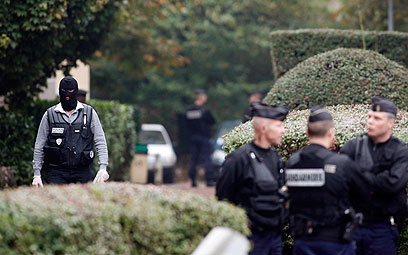
Prosecutor: French terror cell planned Syria trip
New details about French Islamists behind grenade attack on kosher market reveals they left wills, were 'lured by prospect of jihad in Syria'
A network of French Islamists behind a grenade attack on a kosher market also planned to join jihadists fighting in Syria, a state prosecutor said Thursday, calling the suspected terrorist group potentially the most dangerous established in France since the 1990s.
Five of the 12 people arrested in sweeps in cities around France have been freed, said the prosecutor, Francois Molins.
Related stories:
- Jews in France fear wave of attacks
- Paris: kosher supermarket attacked
- Blanks fired at French synagogue
He said seven people remain in custody a day after police discovered bomb-making materials in an underground parking lot as part of a probe of an "extremely dangerous terrorist cell." The seven, aged 19 to 25 years old, were all born in France, he said.
The Sept. 19 attack on the market in Sarcelles, outside Paris, shattered windows and injured a customer at the store.

Clearing the explosives from the scene (Photo: AP)
It has revived French concerns that home-grown Islamic militants want to link with international Jihad and carry out terrorism in France – this time, notably, against Jewish targets.
"The intent was to kill," Molins said. "It was just lucky that it (the attack) didn't have the consequences desired by the culprits." He noted that despite five days of questioning, when those held were mostly uncooperative, it was not clear whether the two culprits of the attack were in custody.
Nonetheless, the prosecutor hailed "the dismantling of a terrorist group that is probably the most dangerous brought to light in France since 1996." Back then, Islamic militants linked to a bloody insurrection in former French colony Algeria carried out a series of bombings in France.
Molins said that the bomb-making materials turned up in the underground garage could have been used in "exactly the same type of construction and mechanism used in 1995 by GIA activists" – the French acronym for the now-disbanded Armed Islamic Group in Algeria.
In the garage, investigators found rifles, ammunition, a bottle of candle wax, 3 kilograms of potassium nitrate, a bag of charcoal, 1-1/2 kilograms of sulfur, electric cables, batteries, five car headlight bulbs, and a pressure cooker, Molins said.
"We aren't underestimating either the internal or the external threat," French Justice Minister Christiane Taubira said in an interview with Europe 1 radio In Syria, most of those fighting against President Bashar Assad's military are believed to be ordinary Syrians fed up with the authoritarian regime and soldiers who have defected, analysts say.
French authorities have been on high alert for possible terror attacks by radical Islamists after Mohamed Merah, a Frenchman who claimed links to al-Qaeda, shot and killed three Jewish children, a rabbi and three paratroopers in southern France in March.

Raid on terror suspects (Photo: AFP)
French authorities opened a judicial investigation Thursday over the Sarcelles grocery attack for attempted murder, notably on the basis of the potential victims' religion and in connection with a terrorist organization, the prosecutor said.
Related potential charges included the illegal possession of explosive devices, theft, use of stolen property, and illegal possession and transport of firearms.
It's now up to investigating judges whether to file preliminary charges.
Terrorists left wills
The case involves two components: The kosher grocery attack, and the recruitment network. The prosecutor wants seven charged in connection with the alleged network, and six of them in the grocery attack.
Two suspects "had the mission of recruiting and sending individuals to carry out jihad in some countries – notably Syria," Molins said. Two members of the cell had recently spent three months each in Tunisia and Egypt, though police interrogations haven't turned up why they were there, he said.
DNA traces found on the grenade led anti-terror police to Jeremie Louis-Sidney, a 33-year-old convicted drug dealer who, Molins said, converted to radical Islam in prison. Louis-Sidney was killed in a shootout with police on Saturday.
The only other suspect identified by name was Jeremy Bailly, who – instead of Louis-Sidney, as first thought – appeared to be the group's ringleader, Molins said. Bailly had rented the garage where the explosives were found, and investigators found a key to it in his home.
Police investigators turned up five wills that contained "religious recommendations that consisted of saying, 'the day that I won't be here... respect your Muslim duty, give my iPod to my sister, such-and-such item to my brother-in-law,' etc.," Molins said.
French investigators believed they headed off a potentially deadly terror attack, though it was unclear what the target might be. Bailly told investigators that "he wanted indeed to build a bomb, but without naming either his accomplices or his target," according to Molins.
A French counterterrorism official told The Associated Press on Wednesday that authorities have noticed a recent trend in which young French militants have been lured by the prospect of jihad in Syria.
- Receive Ynetnews updates directly to your desktop










